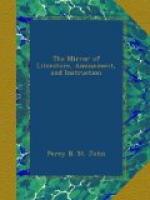* * * * *
Clorinda, or the Necklace of Pearl, is an intensely interesting tale by Lord Normanby, with a most effective illustration by Heath.
But the prose of the “Keepsake” is decidedly superior to the poetry, notwithstanding the high names in the latter list. Mr. Moore’s contribution is, however, only sixteen lines. The poetical pieces consist chiefly of fragments or “scraps”—among which those on Italy, by Lord Morpeth; and three by Shelley, are very beautiful. Our specimen is—
THE VICTIM BRIDE.
BY W.H. HARRISON.
I saw her in her summer bow’r, and
oh! upon my sight
Methought there never beam’d a form
more beautiful and bright!
So young, so fair, she seem’d as
one of those aerial things
That live but in the poet’s high
and wild imaginings;
Or like those forms we meet in dreams
from which we wake, and weep
That earth has no creation like the figments
of our sleep.
Her parent—loved not he his
child above all earthly things!
As traders love the merchandize from which
their profit springs:
Old age came by, with tott’ring
step, and, for the sordid gold
With which the dotard urged his suit,
the maiden’s peace was sold
And thus (for oh! her sire’s stern
heart was steel’d against her
pray’r)
The hand he ne’er had gain’d
from love, he won from her despair.
I saw them through the churchyard pass,
but such a nuptial train
I would not for the wealth of worlds should
greet my sight again.
The bridemaids, each as beautiful as Eve
in Eden’s bow’rs,
Shed bitter tears upon the path they should
have strewn with flow’rs.
Who had not deem’d that white rob’d
band the funeral array,
Of one an early doom had call’d
from life’s gay scene away!
The priest beheld the bridal group before
the altar stand,
And sigh’d as he drew forth his
book with slow reluctant hand:
He saw the bride’s flow’r-wreathed
hair, and mark’d her streaming
eyes,
And deem’d it less a Christian rite
than a Pagan sacrifice;
And when he call’d on Abraham’s
God to bless the wedded pair,
It seem’d a very mockery to breathe
so vain a pray’r.




